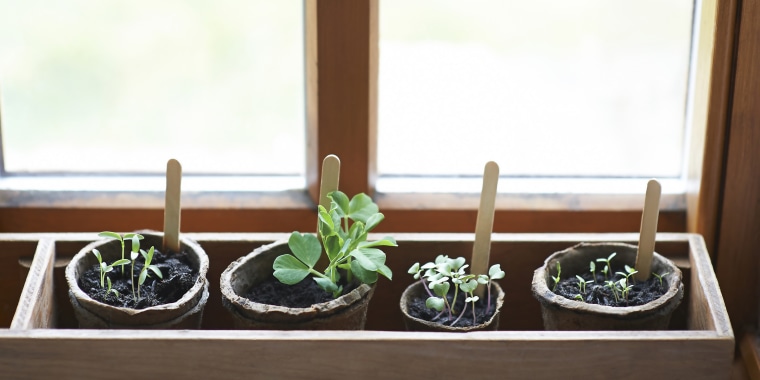Spring is here and it's the perfect time to start a garden! No outdoor space, no sunlight, no green thumb? No problem! A new wave of urban farmers are a testament to the fact that it doesn't take acres of land and tons of resources to start growing. Whether you're looking to start a kitchen garden to grow your own fresh herbs or begin with a small patch of land or container gardens outdoors you just might discover a new hobby that's a great stress reliever, good exercise and a serious mood booster.
Timothy Hammond, founder of Big City Gardener, told TODAY Food that even if you have no outdoor space, you can still become a gardener.
"If you have minimal outdoor space, you will want to look to grow your herbs on a windowsill," Hammond said. "An overhead kitchen light can also act as a light source. Get a small pot or container and fill it with the best potting soil available to you. Then plant herb transplants from your local nursery. If you have a window that gets more than five hours of sunlight, you will also be able to grow leafy greens like leaf lettuce."
Indoor herbs
One of the benefits of a kitchen garden is that there's no need to wait for the last frost date to start planting. Hammond said that herbs that will grow well in kitchens include:
- Chives
- Mint
- Cilantro
- Parsley
- Oregano
- Thyme
"If you have a kitchen that doesn't receive much light, you can still grow but know that your plants may end up thin and leggy," he said.
Start small
If you do have some outdoor space to work with start small, advised Hammond. Decide whether you'll plant into the ground, raised beds or containers.
"Do not try to convert your entire space in your first gardening season," he said. "Start with herbs and plants that you know you will eat."
Hammond said herbs are great because you can use them in every meal you make.
"Once you start to grow and use your herbs, you will feel more accomplished," he said. "Once you've reached this level, with some successful harvest and a passion for gardening starting to form, then you should begin to think about expanding."
Herbs not your thing? Try growing leafy greens.
"The thin, shallow roots allow these plants to be grown in almost any container you have lying around," he said.
Visit your local nursey
Starting with seedlings (versus those little packets of seeds) will give you a head start and it's fun to document how much they grow over the course of a season.
"There are so many different varieties of herbs. Spend some time just browsing through your local nursery, rubbing and smelling the leaves," suggested Hammond. "Something is guaranteed to spark your interest," he said.
As you allow your garden to grow, you may find that your passion for gardening will grow too.
"Don't be in a hurry to try to grow everything. Start with beginner crops that do not require much knowledge of pests and fertilizers. Work your way towards the harder fruiting crops such as tomatoes, peppers and squash."
Choose quality soil
Hammond said that one mistake new gardeners make is not paying attention to the quality of the soil they are using.
"Everyone puts so much attention into the aesthetics of a garden and often overlook the most essential garden aspect — the soil," he said. "Good garden soil contains billions of microorganisms. The health of these microorganisms and the health of your soil will determine what kind of gardening season you will have."
When it comes to starting your garden, Hammond's best advice is to "just grow it."
"Don't be afraid to kill a few plants during your gardening adventure," he said. "And always be willing to learn."
Hammond also said it's important to avoid comparing your garden to what you see on social media.
Gardening truly has so many benefits that go beyond the ability to pick your own herbs and vegetables from your backyard or windowsill. Tending to your plants by watering and weeding when necessary can be a stress reliever and a way to connect with nature. Your new hobby may also turn out to be a great way to connect with others.
"Remember why you began gardening and what you want to achieve," he said.

